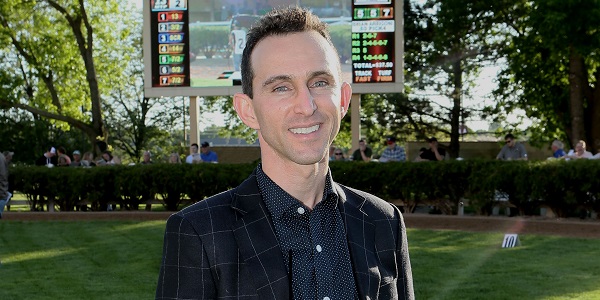Life is simply life, doling out random events that sometimes bring about unexpected consequences, changing level landscape into difficult terrain that calls for a change of perspective and, maybe, a renewed commitment to the process.
Or, to put it in a much used nutshell: Be ready! Stuff happens.
Somewhere between those two extremes, is the space where Ramon Dominguez finds himself today, forcibly retired from a sport in which he excelled much earlier than anticipated and yet still able to stay committed on its fringes, keeping his eyes open and his mind alert to new opportunities.
Dominguez, 40, was among thoroughbred racing’s elite riders during a career in which he won 4,985 races, a statistic he uses today as a means of explaining how he came to terms with the head injury that forced him to the sidelines of a cherished occupation much sooner than he planned.
As he explains it, he could choose to view that number as 15 short of 5,000 or as five more than 4,980.
“I choose to be happy,’ he explained.
For all appearances and evidence, he is just that, a rarity of a man who stands in stark conquest to so many others in the profession _ refined in manner _ debonair _ and well spoken in the appealing Spanish accent of his native Argentina.
Dominguez, 40, had a remarkable riding career, winning numerous notable stake races around the country, primarily in the East. Although a Triple Crown win eluded him, he won two Breeders’ Cup races, is a three-time Eclipse Award winner as the nation’s outstanding jockey. He twice won more races than any other rider in the nation in a single year. He won six races on a card three times, only the second rider at Saratoga to win that many in a single day. He was the regular rider of two-time Eclipse Award winning turf champion Gio Ponti. In 2012 he set the record for single-season earnings by a jockey, riding horses that brought home $25,582,252 in earnings. In 2012, Dominguez rode 322 winning horses, leading the New York Racing Association for the fourth consecutive year. Last year he was inducted into the National Museum and Racing Hall of Fame.
The world was his oyster, there for the shelling. Then on January 18, 2013, a fall at Aqueduct robbed him of his memory for the next three months and ultimately his career. The decision, he explains today, was difficult at first. Acceptance did not come immediately, but the future, he knew, did not include racing. “Change comes hard to human beings. But we must do it to be happy,” he said in the convincing manner of someone who understands the distinction between acceptance and mere resignation.
Dominguez has a home near Belmont Park, where he lives with his wife, Sharon, and sons, Alex 12, and Matthew 10. They have a second home on the water near Saratoga. He has handled his earnings wisely, and by some accounts is a millionaire 40 times over, maybe more. Whatever makes him the person he is, Dominguez credits to his parents, who visit yearly from Argentina. “I owe all of it to my parents,” he said. “They are good people, humble people.”
Still, Ramon can not credit his father for the occupation he chose and that provided so much. The senior Dominguez allowed his son, at age 16, to begin show jumping, as a detour, a distraction as Ramon puts it, to keep him from horse racing. “He didn’t want me to become a jockey,” Ramon explained.
Show jumping held his interest only briefly because at age 13 Ramon had already decided what he wanted to do with his future.
Dominguez came to the United States in 1996, beginning his career at Hialeah Park in Florida. The jump start he hoped for came five years later after winning more races than any other rider in the U.S. He did that again in 2003 and the next year had the highest winning percentage of all American-based riders.
Still, as he does today in whatever he undertakes, Dominguez did not allow himself to think that he had arrived, something he says is an ongoing process that continues for him despite what he has already accomplished, in whatever it is he undertakes.
“Human beings continue to make mistakes and we must learn from each of them,” he said, revealing what enabled him to remain modest, in addition to his parents’ example. “Someone who allows pride or ego to take over will not continue to improve,” he said. “We keep learning throughout our lives.”
“That’s the way he is. What you see is what you get. Very straight forward. That’s him,” said rider agent Bill Castle, in Shakopee to visit with trainers and his rider J.D. Acosta over the weekend. Castle, Dominguez and agent Steve Rushing, friends and business partners in various racing activities, created all sorts of speculation with their visit to Canterbury.
“Everybody wants to know what we’re up to. I’ve gotten texts from Prairie Meadows, all over the place, wondering what we are doing here at Canterbury,” said Castle, who manages Acosta’s book from New York. “We came to see J.D. and round up some more business for him, see people face to face and visit some barns.” Castle explained further that he and Rushing have been friends for twenty years or more and that Rushing once had Dominguez’s book _ creating a link to the presence of the Hall of Fame rider.
Today, Dominguez, among other things, devotes time to disabled jockey activities, trying to create awareness that rider insurance and welfare is not a jockey issue “but an industry issue.” The same goes for the other athletes in the sport, the horses. “They are athletes, too,” he said.
